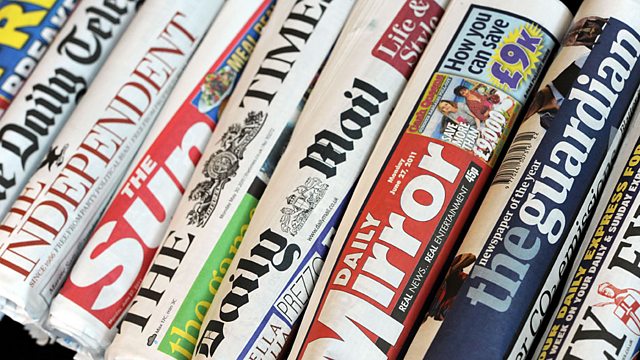06/01/2016
Andrew Rawnsley chairs a live discussion with top journalists as they debate what three newspaper-style editorials should say about the main stories in the news.
In the first of a new series of Leader Conference, Andrew Rawnsley is joined by Mary Riddell of the Daily Telegraph, Bronwen Maddox of Prospect; Hugh Muir of the Guardian; Kevin Maguire of the Daily Mirror; and Caroline Wheeler of the Sunday Express.
Three subjects in the news are chosen for the three "leaders". Two of these reflect current events at home and abroad - and prompt lively and provocative discussion. The third subject is in a lighter vein.
Contributions from listeners are also encouraged throughout the programme via e-mail, using the address leaderconference@bbc.co.uk and on Twitter using the hashtag #r4leader.
Following the discussion of each of the three subjects, Andrew invites one of his guests to draw up on air the "leader" for that subject setting out its main points. This important component of the programme helps ensure that resolution of the debate is achieved for listeners and that the full range of views expressed is reflected.
The leaders are posted online at the Radio 4 website the day after the programme is broadcast.
Producer Simon Coates.
Last on
We discussed:
Leading from behind听
At the start of 2016, both David Cameron and Jeremy Corbyn are struggling to show they are in charge of the parties they lead. Separate issues bedevil them鈥晅he future of the UK鈥檚 membership of the EU for the Conservatives and of Britain鈥檚 nuclear deterrent for Labour. But neither can be fudged.
Mr Cameron wants to portray as sensible politics his decision to allow ministers who disagree with his stance on the EU to campaign against him in the forthcoming referendum鈥晈hile remaining in his government. But it is likely only to postpone the moment of reckoning.
A case can be made for Mr Cameron鈥檚 wisdom in recognising reality: his party is irreconcilably divided on the EU and forcing his colleagues to back him is fraught with risks. But to suppose that Tories will miraculously come together after the referendum is merely the latest triumph of hope over experience. Buying an uneasy peace now suits Mr Cameron; the next Tory leader will probably rue his concession.
This should, meanwhile, have been the moment for Mr Corbyn to exploit the prime minister鈥檚 problems. He should have made the case for the social Europe Labour has championed and presented it as a coherent party of opposition. Instead, his ineptly managed reshuffle has reinvigorated his critics. He has also decryed the very dissent he championed in three decades on the backbenches.
Mr Corbyn does now have a shadow defence secretary who shares his view on nuclear weapons. But Labour no less than the Conservatives has to face up to an issue it would prefer not to confront: whether or not to have a nuclear deterrent. It is little surprise that, in what is a less deferential age than the 1970s, voters have little time for politicians and parties that seem to see the world not as it is but as they wish it to be.听 听听
Our friends in the Middle East
The chill which has long threatened to descend on relations between Tehran and Riyadh is now being felt across the Middle East. But its effects go far beyond the region. Britain needs to make use of its strategic relations with both countries to prevent direct military conflict between them.
The two nations are already effectively at war in both Yemen and Syria. The results have been disastrous for those countries, while the consequences for Europe have been seriously destabilising in the form of the refugee crisis. Failing to engage with the regimes in Riyadh and Tehran would be an abdication of responsibility when so much is at stake in humanitarian, economic, military and political terms. The possibility of Saudi Arabia arming itself with nuclear weapons is just one of the dangers which may result from inaction or, worse, cutting ties with Riyadh.听
What form should engagement take? First, it should be recognised that Saudi Arabia is undergoing deep change quickly. It remains sensitive to outside criticism. Britain as a major arms supplier鈥晈hich it should remain as it is in our mutual interest to do so鈥昫oes have leverage. It should be used to underline the importance of protecting and nurturing human rights across the kingdom.
Britain also has a role to play with Iran. The abuses perpetrated by Tehran have been just as worrying as those in Saudi Arabia, if not worse. But, as President Obama has made clear, it is important to encourage further reform in Iran and demonstrate that working with the West helps economic and social development. Otherwise Iran may engage more with Russia. That would not be in Western interests.
It should be more of you 听听
This week鈥檚 national lottery jackpot of 拢50.4 million has not been won. These big jackpots are inefficient, sometimes damaging to the recipients because the prizes are so large and difficult to manage and arguably against the spirit of the lottery. The odds should be shifted by a few thousand of a decimal point in favour of the player. Rather than offering a single massive prize, a larger number of smaller jackpots should be awarded鈥晄ay, fifty 拢1 million pots. This would ensure continued public interest in and commitment to the national lottery while awarding prizes that spread wealth a smidgeon further. There would be very little effect on the good causes which benefit from the lottery. We anticipate, of course, little enthusiasm from the operator for such an innovation. But the democratic and financial gains for those who pay for the lottery and make it what it is would significantly outweigh such self-interested objections. The government should accordingly renegotiate the contract and end unnecessary, excessive jackpots. Forget rollovers; roll on reform.
Broadcast
- Wed 6 Jan 2016 20:00大象传媒 Radio 4

